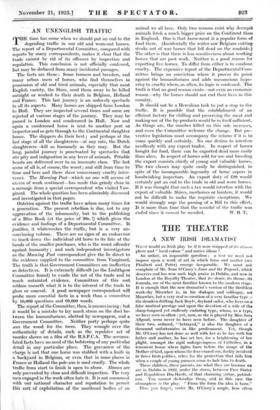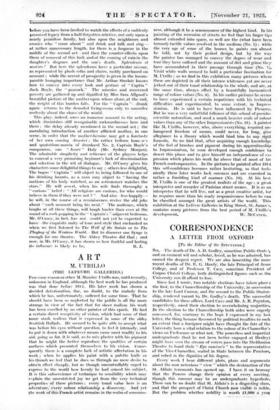THE THEATRE
A NEW HUSH DRAMATIST
WHAT would an Irish play be if it were stripped of its atoms. phere and " local colour 7 and natiye idiom An unfair, an impossible ,question ; a test we need not impose upon a work of art in which form and matter (see Flaubert and Pater) emerge inseparable. We must not complain of Mr. Sean O'Casey's Juno and the Payeock, which deserves and has won such high praise in Dublin, and now in London at the Royalty Theatre, that its. donee, its theme,' its formula, are of the most familiar known to the modern stage. It is enough that the new dramatist's version of the thriftless work-shy Micawber is, in his dialogue and soliloquy, -tml Micawber,.but a very real re-creation of a very familiar type. the drunken drifting Jack Boyle, dryland sailor, who lives on a false nautical prestige and upon the devotion of a wife of the sharp-tongued yet endlessly enduring type, whom, as a type, we have seen so often ; yet, now, as she is played by Miss Sara Allgood, seem never to have seen before. The daughter of these two, seduced, " betrayed," is also the daughter of a thousand unfortunates in like predicament.. Yet, though Mr. O'Casey has not done so well with her as he has with her father and mother, he has set her, for a heightening of her plight, amongst the rigid unforgivingness of Catholics, in a tenement house where lights burn before the image of the Mother of God, upon whom the fear-crazed son, darkly involved in fierce Irish politics, relies for the protection that fails him when a couple of young gunmen come to hale him to death.
These children, these parents, are what they are because we are in Dublin in 1922, under the stress, between Free Stater and Republican Dio-Hards, of that charming virtue, patriot. ism. You cannot de-loCalize them, and in this case the atmosphete is the play. " From the form the idea is born."
Thus you forget, under Mr. O'Casey's magic, how often before you have been invited to watch the effects of a suddenly promised legacy from a half-forgotten relative, not only upon a nearly lie nnitess family, but also upon-the. neighbours and cronies who " come about " and drink and talk and sing- atjather unnecessary length, for there is, a longueur in the middle of the second act—and then the counter-effects upon them of removal of this hick and of the coming of ruin in the daughter's disgrace and the son's. death.. Splendeurs et uusires ! But here the splendours have a particular savour, represented by pluSh sofas and chairs, rashly purchased on aceotinf; while the accent of prosperity is given in the incom- parable lounging iinpoitance. that Mr: Arthur Sinclair knows how to convey into every look and -gesture 'of " Captin " Jack Boyle, the " peacock." The miseries and recovered poverty are gathered up and dignified by Miss Sara Allgood's beautiful picture of the mother Upon whom alone, at the end, the Weight of this burden falls. For the " Captain "—drunk again=-returns to the denuded living-room only to maunder UsielesSly-about the chios'of the world. - • - - • - • This play, indeed, owes an immense amount to the acting, which diminishes still recognisable --awkwardnesses here and there : the delay already mentioned in the second act ; the moralizing introduction of another afflicted mother, in one scene, in 'order that the mother-heroine may get a foretaste of her own coming disaster ; the rather tedious hummrs and quotations-Mania of drunkard No. 2, Captain Boyle's companion; one " Joxer " Daly (Mr. Sydney Morgan). The admirable simplicity and reticence of the players helps to Conceal a Very promising beginner's lack of discrimination and selection iwthe •wit of dialogue. Mr. O'Casey gives his character's sonic delightful things to say ; others less delightful. The bogus " Captain " will object to being followed to one of his drinking haunts, as a man may object to " having the motions of his body watched, as an astronomer watches the Stars." lie will assert, when his wife finds theosophy a " curious " belief r " Alt religions are curious, for who would believe in them-if-they were not ? " And also—less happily- he in the course of a reminiscence, revive the • old• joke about'` each moment being his next." The audience, which laughs at all these. things, will laugh louder than ever at the sound of a cork popping in the " Captain's 't adjacent bedroom. Mr. O'Citsey, in fact, has not— -could not yet be expected to have--the exquisite unity of tone and style that enchanted us when we first- listened to - The Well of-the -Saints or to The Playboy of the Western. World - But to discover one Synge is enough for one theatre. The Abbey Theatre did that ; and now, in Mr. O'Casey, it has shown us how fruitful and lasting















































 Previous page
Previous page